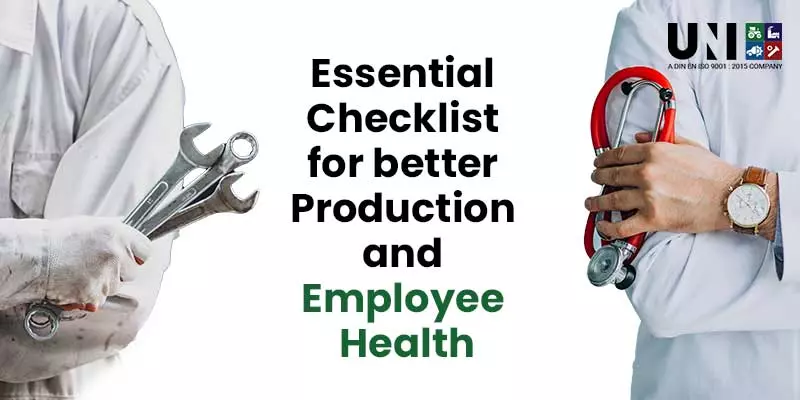
Developing a workplace safety and health program is one of the most effective ways to protect the most valuable asset: your employees. Losing workers due to injury or illness, even for a short period of time, can cause significant disruption and cost to us and their families. It can also harm job satisfaction, productivity, gross revenue, and status.
Manufacturing units are frequently regarded as the ‘backend’ locations of occupational organizations, rarely
visible to clients and customers. The concept typically encourages management to disregard its proper
upkeep. A
disorganized manufacturing unit can have a significant negative impact on overall business productivity.
Workers
will struggle to locate the poorly maintained machines or will have to postpone the loading of goods.
Untidy floors after each shift, as well as wreckage and liquids left unattended, can create major safety
risks
to the factory and workers. At Unispares India, we believe that carelessness can lead to workplace damages that
are
costly to the company. Furthermore, an employee may require additional time to complete the incorrect task.
Communication with the manpower in the manufacturing sector can be more difficult than with the employees in
many other industrial sectors. Frequently, manufacturing workers work in settings without easy access to
desktop
computers, where conventional internal communications materials are sent. They may work in manufacturing
plants,
warehouses, or other non-desk facilities where goods are produced and shipped.
An alerting gadget is a fantastic communication tool for the industrial industry. This challenge could be
overcome by utilising it to send notifications to a variety of devices, making sure that every employee
receives
them. Messages can be sent to laptops and PCs. For mobile workers, notifications are provided to an app for
smartphones and tablets. SMS alerts are accessible on smartphones.
Start by making some minor changes if your manufacturing business is having trouble with employee engagement
and
internal communications. Your company will reinforce its internal values in its plants, factories, and
outlets,
become more cohesive and operate more effectively if internal communication is given top attention.
Directing an audit of our raw materials QMS, typically following ISO 9001 standards, helps us verify incoming inspection processes. This kind of assessment often includes spot checks related to inspection processes, such as:
The benefits of health screening for the workforce are numerous for our organisation as a whole and for our employees. A health check-up is always worthwhile from the perspective of the organisation. The employee health check-up is a unique service provided by the employer to establish a close relationship between the personnel and the business. Better performance allows the team to do more, which leads to increased employee and company growth.
The lighting quality in a work area can remarkably affect productivity. With adequate lighting, workers can harvest more products with fewer mistakes, leading to a sufficient upsurge in output. Good lighting can even reduce errors by 30-50 % and minimize eye strain and the headaches, nausea, and neck pain that often accompany eyestrain. Sufficient lighting allows workers to focus better on their work which increases productivity. The level of lighting that employees need varies, contingent on the nature of the duty, the quickness of the workers’ eyesight, and the atmosphere in which the task is conducted. A detailed study, such as amassing small parts or mechanical drawing, needs a great deal of light. Instead of handling materials or packaging, coarse work requires less light. We think good lighting in the work facility encourages the following:
Industrial waste can come in the form of solids, semi-solids, or liquids. Hazardous or toxic waste or
non-hazardous waste are both plausible. The manufacturing waste can contaminate streams and pollute the soil
and
surrounding water bodies. The most significant advantage of industrial recycling is that one is putting less
burden on the Earth’s resources by discovering ways to reuse or recycle industrial trash.
The requirement to manufacture new raw materials is minimized when industrial waste materials and
by-products
are recycled. When the trash is not correctly controlled, it can lead to future problems that will cost
money to
resolve. We run manufacturing units more efficiently and assign resources to growth efforts rather than
crisis
response using waste administration practices.
As a result, there are many challenges facing the waste management and recycling industry. Still, much good
work
is being done to ensure that it is an industry to be proud of and that it will continue providing practical,
supportable, and eco-friendly waste management for many years.
Unispares India, as a responsible employer, understands that the primary goal of a safety and health programme is to prevent workplace injuries and illnesses, as well as the inconvenience and financial hardship that these actions can cause for workers, their families, and their employers. We’ve discovered that implementing these recommended practises has additional benefits. Product, process, and service quality, as well as workplace confidence, have all improved because of the transformed or improved commitment to safety and health, as well as the supportive environment encouraged by employers and workers.